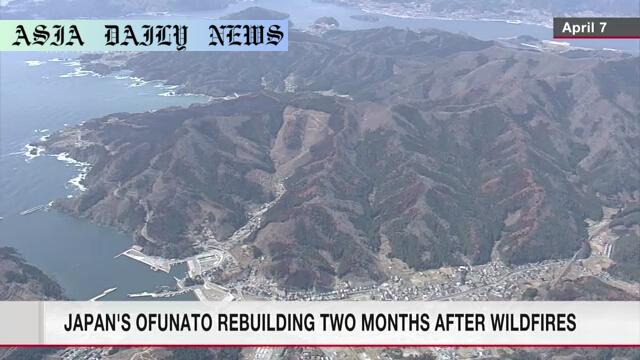Wildfires: Ofunato City makes strides in recovery after destructive forest fires, addressing housing issues and landslide risks.
- Massive wildfires in Ofunato damaged 222 structures and burned 3,370 hectares.
- 193 residents remain displaced, awaiting temporary housing units.
- Preventive measures against landslides are underway for the rainy season.

Introduction: The Devastating Impact of Ofunato’s Wildfires
The city of Ofunato in Japan’s Iwate Prefecture is grappling with the aftermath of extensive forest fires that began on February 26, leaving a trail of destruction in their wake. The disaster claimed one life, damaged 222 structures—including homes—and scorched an area of about 3,370 hectares before finally being contained on April 7. While two months have passed since the fires broke out, the scars they left have not yet healed, as residents, local officials, and the community collectively work toward rebuilding lives and infrastructure.
Despite the devastating losses, the city is striving to overcome the challenges posed by this natural disaster. Residents continue to face significant hurdles, including displacement, housing shortages, and an added threat of landslides during the impending rainy season. These compounded difficulties underline the urgent need for proactive measures and efficient recovery strategies to restore a sense of safety and normalcy in the region.
Resettling Displaced Residents: A Gradual Return to Stability
The aftermath of the fire has displaced 193 individuals who have since been living in evacuation centers or with relatives. The city’s efforts to provide public housing have brought hope to those who were left homeless. On April 25, families began transitioning into public housing, providing a glimmer of stability amidst prevailing uncertainties.
Plans are also underway to construct temporary housing units in two locations, which are expected to be completed by early next month. These facilities aim to provide immediate, interim solutions while authorities explore sustainable, long-term housing programs for affected residents. For those who lost homes, this initiative represents a significant step forward in reclaiming their lives and proceeding with resilience and fortitude.
Managing New Threats: Landslide Prevention Efforts
While the worst of the fires has passed, Ofunato City now faces concerns over the upcoming rainy season, which could exacerbate landscapes already weakened by fire damage. The wildfires destroyed vegetation that previously held soil in place, reducing the land’s water retention capacity and increasing the risk of landslides. This presents a serious hazard to the safety of recovering neighborhoods.
To address this issue, Iwate Prefectural officials are implementing preventative measures, including the strategic placement of large sandbags in high-risk areas. These mitigation strategies aim to minimize landslide occurrences and further protect the area from prolonged disaster-related consequences. Such actions display the local government’s commitment to not only rebuilding but also safeguarding the affected community from subsequent environmental risks.
Community Resilience and the Path Forward
The collective efforts of local authorities, residents, and volunteers symbolize the enduring spirit of solidarity within Ofunato. Although the tangible damage from the wildfires is immense, unyielding community cooperation exemplifies humanity’s resilience in rebuilding lives after disasters.
Moving forward, Ofunato offers a critical case study for disaster preparedness and response. While the immediate focus remains on providing shelter and preventing further devastation, long-term strategies must now turn toward creating sustainable recovery models. Addressing climate-related disasters must involve a balance of immediate relief and intricate planning, ensuring afflicted communities can recover fully while preventing future catastrophes.
Conclusion: A Hopeful Yet Cautious Outlook
The story of Ofunato’s recovery highlights the challenges faced by cities struck by natural calamities. While progress in mitigation and rebuilding programs is noteworthy, continued attention and resources are needed for long-term restoration. Addressing immediate needs and tackling long-term risks will require collaboration between local entities and the global community. By drawing on lessons from this tragedy, other regions can bolster their preparedness for similar environmental challenges, fostering resilience and hope in the face of adversity.



Commentary
Reflecting on Hope Amidst Disaster
The devastating wildfires in Ofunato remind us of nature’s unpredictable and destructive force, as well as the resilience of human communities that rise from devastation. It is heartening to see how quickly the city is working toward recovery, like rehoming displaced individuals and addressing environmental risks. These are steps signaling not only determination but also compassion within the community. Public housing projects and temporary shelters show that, even in times of despair, the human spirit finds ways to mend and heal.
The Importance of Environmental Safeguards
One of the critical challenges brought to light by this disaster is the cascading threat of environmental imbalance. The destruction of vegetation in forest fires not only robs the land of its natural beauty but also exacerbates hazards like landslides and soil erosion. Ofunato serves as a stark reminder of how climate-related disasters can have prolonged ripple effects, impacting all aspects of life. Proactive strategies by local officials, such as deploying sandbags to prevent landslides, should be key components in global disaster responses going forward.
Learning from Ofunato’s Resilience
As I reflect on the story of Ofunato, I am struck by the interplay of tragedy, resilience, and hope. The recovery process demonstrates that even in the face of massive destruction, communities have the power to rebuild and adapt. This tale of unity and effort is not just about bouncing back but about creating sustainable solutions. For cities across the world facing similar vulnerabilities, Ofunato’s experience offers valuable lessons in human persistence and the importance of comprehensive disaster management planning. As the city moves forward, I join countless others in hoping for a future filled with safety, stability, and renewed purpose.